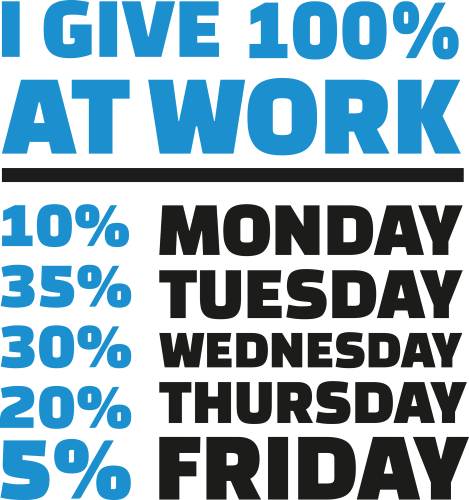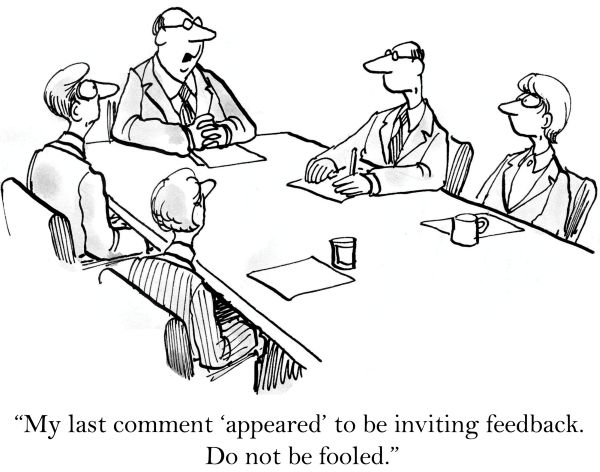Office Bullshit : Corporate Jargon and Office Lies You've Heard 1000 Times Before!
Decoding Corporate Jargon: The Words We Love to Hate
Corporate jargon, or as I like to call it, waffle flavoured word soup, is the workplace equivalent of Marmite: you don’t love it, and if you do then you’re not right in the head department.
It’s a language that straddles the line between impressive and irritating. It’s both art and arse, designed to sound smart while saying as little as possible.
The Common Phrases and What They Really Mean
Here’s a breakdown of the most overused, underwhelming corporate expressions—and the brutal truths they’re masking.

Corporate Jargon: “Giving 110%”
Translation: We expect you to do the work of two people without extra pay.
This is corporate math at its finest. Apparently, in an office setting, people are just supposed to shatter the laws of physics and time for the glory of Karen Kracken’s Q3 goals. But guess what? Even at 110%, there’s always someone implying you could’ve given 120%.
Corporate Jargon: “Let’s Align”
Translation: I’m about to tell you what to think.
When someone says, “Let’s align,” don’t be fooled into thinking this is a collaboration. It’s not. This is someone’s subtle way of saying, You’re going to agree with me by the end of this, whether you like it or not. Bonus points if they throw in a PowerPoint presentation with quirky graphics to make you feel like it’s an actual discussion. It’s not.
Corporate Jargon: “Leverage Our Core Competencies”
Translation: Let’s do what we always do and pretend it’s innovative.
Ever been in a meeting where someone says this and every ladder climbing bumlicker nods like it’s a revelation? It’s not. It’s code for, “We’re lazy, so let’s just rehash the same process we’ve been using for a decade and hope no one notices.”
Corporate jargon isn’t an accident. It’s a survival tool

Corporate Jargon: “Run It Up the Flagpole”
Translation: Let’s pass this steaming pile of nonsense to Carl, so it’s his bloody problem now.
Barry Talkbollocks from “Operations” has just been handed a project that instantly smells like failure. His genius idea? “Let’s run it up the flagpole and see what leadership thinks.” Barry doesn’t want approval; he wants to shift the blame when everything inevitably goes tits-up. And Carl, poor Carl, is the sucker who’s about to get shafted up the rear with that flagpole when leadership realises they hate this “idea.”
Corporate Jargon: “Actionable Insights”
Translation: We don’t know what the hell this data actually means.
There’s nothing actionable here—it’s just another way to make mundane data sound intelligent. Chances are, the “insights” are already so obvious any chimp paying attention could work it out.
Corporate Jargon: “Put a Pin in It”
Translation: Forget about this forever.
Nothing good comes after “put a pin in it.” If the team lead, Luke Warm, suggests this, whatever idea, concern, or question you raised is now officially buried in the graveyard of forgotten ideas. Rest in peace and lets not mention it again.
Vagueness on Purpose

Corporate Jargon: “Game Plan”
Translation: I have bugger-all idea what to do, so let’s bluff our way through with some vague crap and hope no one calls me out.
Sandra Shortskirt, the self-titled “solutions architect,” catwalks her way into the meeting room ten minutes late (Starbucks latte in hand, obviously) and says, “Let’s get a game plan together.” Great, Sandra. Now we’re all stuck in a brainstorming session where nothing gets solved, and you leave early to “jump on another call.” Truth be told there was never a plan, just Sandra winging it until her next annual bonus.
Corporate Jargon: “Low-Hanging Fruit”
Translation: Christ, can we just do the bare minimum and clock out?
Picture Derek Dullard from “Strategy”, gesturing at a pie chart while droning on about targeting the “low-hanging fruit.”
Translation? Derek wants to tick a box without lifting a stinky finger. It’s a half-arsed effort wrapped up in a phrase that pretends to be smart, but we all know Derek’s just avoiding proper work because he has golf lessons at 4.
Corporate Jargon: “Customer-Centric Approach”
Translation: We’ll say what people want to hear and carry on being utter wankers anyway.
Phil McKavity the head of Sales (and owner of the world’s least convincing wig), frowns dramatically when Olive the bright-eyed newbie suggests fixing customer complaints. “We take a customer-centric approach,” Phil says, which is absolute bollocks. If that were true, we wouldn’t be outsourcing the help desk to a call centre in Outer Mongolia where “support” might as well be handled by pigeons
The harsh truth is, corporate buzzwords are time-wasters

Corporate Jargon: “Bandwidth”
Translation: I can’t be arsed to help you, so here’s a polite excuse.
When Raj Randybeard from IT says, “Sorry, I don’t have the bandwidth,” he doesn’t mean he’s busy. He’s probably scrolling through TikTwot or deciding what to have for lunch. And you? You’re left scrambling to find someone else to give a toss because Raj has “bandwidth problems.”
Corporate Jargon: “Thought Leadership”
Translation: Let’s post some drivel on LunkedIn and hope people think we’re profound.
Enter Fiona Phooksalot, the Marketing Director who’s been “building her personal brand.” She starts every meeting with, “How can we establish thought leadership? ” WHAT? What does she mean by thought leadership? Copying a Oxford Business Bluff article and slapping your firm’s logo on it? Writing a blog no one reads? Fiona’s idea of thought leadership is just trying to sound clever online while doing sweet FA in actual work.
Corporate Jargon: “Win-Win Situation”
Translation: I win, we pretend you win, but really, I win again.
Jerry Jerkson from Sales pitches a “win-win situation” to your department. It involves you taking on more work, fewer resources, and Jerry collecting a fat commission cheque. “See? Everyone wins!” Nice try Jerry…Hope you reverse your company BMW into bollard in the carpark, while everyones watching.
The more senior someone is, the more likely they are to use jargon rather than real language

Corporate Jargon: “Circle the Wagons”
Translation: Let’s close ranks and figure out which poor sod we’re throwing under the bus.
When Nigel Nobnudger from PR says it’s time to “circle the wagons,” there’s trouble brewing. Maybe the client’s threatening legal action, or someone accidentally published a memo about redundancies before telling staff. Regardless, by the end of the wagon-circling session, it’s either Tabitha Tackleteaser from HR or that temp named Gavin taking the blame for the mess. My bet’s on Gavin getting it in places Tabitha wouldn’t.
Corporate Jargon: “Best Practices”
Translation: Let’s rip off someone else’s idea because thinking is just too hard.
Marjorie Mahoossive, who’s never had an original thought in her life, loves using “best practices.” It’s her way of saying, “I googled what other companies are doing, so let’s do that.” You could at least change a word or two in the presentation slides so it doesn’t look like blatant plagiarism?
Corporate Jargon: “Reach Out”
Translation: Email Jeff so I don’t have to, then cc me so I get credit.
Madeline Muddles from Legal loves to say, “Why don’t you reach out to Procurement about this?” What she means is, Why don’t you do my job for me, and maybe I’ll skim the email later and act like I contributed. Classic Muddles—always working hard at hardly working.
Meetings stop being conversations and become pantomimes

Corporate Jargon: “Innovation Pipeline”
Translation: We’ve got absolutely nothing, but it sounds better if we say we’re building something.
Greg Gory from Product Development stands in front of the quarterly meeting and starts banging on about the “innovation pipeline.” In reality, the pipeline contains one useless half finished idea, a whiteboard marker running out of ink, and a pile of wishful thinking. Pipesuckers, the lot of them.
Corporate Jargon: “Move the Needle”
Translation: Please do something! anything, so I can look good on Monday’s call.
Katherine Klinkerknickers from Finance is panicking. Her department hasn’t delivered jack-all for two months, so now she’s pleading with the team to “move the needle.” What she really means is churn out something barely presentable so the higher-ups stop asking if I’m incompetent.
Corporate Jargon: “Value Proposition”
Translation: How can we con people into paying more for less?
Dennis Pennis, the smug Head of Pricing Strategy, has just unveiled a new “value proposition ” for the company’s flagship product. It’s the same crap as last year, but now it’s 15% more expensive and comes in new packaging that Dennis claims “elevates the brand.” Nothing says “value” like screwing over your customers with even less effort.
Corporate Jargon: “On My Radar”
Translation: I know this is a problem, but I’m going to ignore it until it explodes.
Dixie Normous from Compliance assures everyone in the meeting that the glaring issue you flagged is “on her radar.” You know what that means? Absolutely nothing. Come back in six weeks, and that problem will have grown legs and a Twatter account while Dixie pretends it’s the first she’s heard of it.
Endgame: Use Real Words
Here’s the truth: corporate lingo isn’t going anywhere. But that doesn’t mean you have to participate. If you want to stand out, ditch the fluff. Say what you mean. When someone suggests “optimizing workflows,” ask them for specifics. When they say, “circle back later,” ask for a timeline.
Because the real power move isn’t mastering corporate jargon—it’s refusing to play the game. The alternative is smile, nod, shut off your brain and pour yourself a large drink after work.
Bonus Section!
Here’s a lovely little selection of corkers for you to mull over :
synergistically productize equity invested core competencies
rapidiously network team building clouds
completely incept maintainable potentialities
progressively grow high standards in convergence
holistically brand economically sound leadership skills
dramatically synthesize enabled deliverables
quickly synthesize resource-maximizing channels
appropriately disseminate extensible partnerships
assertively empower sustainable potentialities
efficiently transform clicks-and-mortar fungibility
progressively transition cross-unit strategic theme areas
synergistically brand holistic portals
holisticly synergize multidisciplinary virtualization
! IMPORTANT ANNOUNCEMENT !
Help me baffle the Kookle Algorithm! PLEASE SHARE this site with anyone and everyone you think might get at least 5 seconds of middle-aged joy from it.
This site—complete with its chaotic spelling, grammar blunders, questionable layout, and blog posts that defy all logic—is everything a ‘successful’ blog shouldn’t be. And that’s where you come in: I need all the help I can get!
Once I turn this masterpiece into a global brand and rake in £10,000 a month, I’ll reward my loyal supporters in a way they’ll never forget. (something liked a signed picture from my dog)
Thanks a bunch for your support!
